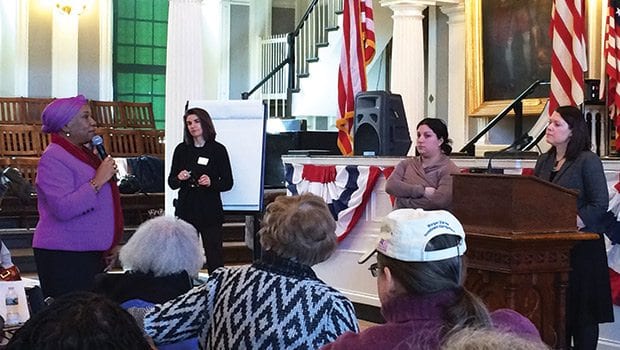
On the Web
For more information on Age-Friendly Boston and the city’s Elderly Commission, see these websites:
agefriendlyboston.wordpress.com
www.facebook.com/bostonelderlycom mission
Andrea Burns, Age-Friendly Boston director, 617-635-4877
For senior citizens, city living can be the ticket to holding onto independence: access to the corner store or lunch spot by foot, public transportation options to get to the health center or City Hall, neighbors or family members nearby who can drop in to check on well-being, offer assistance or chat over a cup of coffee.
On the other hand, viewed through an elder’s eyes, the city’s walk lights can be frighteningly brief, T station stairs steep and places for gathering with other seniors few and far between.
Mayor Martin Walsh and the city’s Elderly Commission have launched an Age-Friendly Boston initiative with the aim of making Boston a place that supports senior citizens in continuing to lead productive, safe and healthy lives.
Walsh spoke Saturday to an audience of some 100 seniors and senior advocates gathered at Faneuil Hall for a Civic Academy on the topic, a city-led forum that encouraged attendees to voice their concerns and desires about aging in Boston.
“Boston is the youngest per capita city in America, but also, our senior population is growing faster than anyone else,” Walsh said, “so how do we make sure the city is open and accessible for people who live here, who have invested in the city, who have made the city what it is today?”
The city’s new housing plan calls for an additional 5,000 units of senior housing, Walsh noted, in addition to creating and freeing up more housing for middle-income people of all ages. He mentioned recent city actions, including a series of neighborhood engagement walks and efforts to make the city more walkable, improve transportation and make parks and open spaces safe and accessible to people of all ages.
The mayor stressed that sessions like the Feb. 28 forum are not just for receiving answers to questions, but also for making suggestions.
“I’d like to see a big senior center,” said Ernestine Washington, 67, of Roxbury. “We’ve got plenty of centers for all ages — the YMCA, the Kroc Center — I’d love to see a senior center for us, with a pool I can walk into.”
A man from South Boston lamented the loss of family neighborhoods and the increasing turnover of younger neighbors without children.
“There’s no sense of community, and no one to shovel sidewalks,” he said. “We need more affordable, family-friendly housing.”
Some comments revealed the vulnerable side of aging without proper support. A 69-year-old Roxbury homeowner said she needs a way to communicate with the police confidentially when “something’s going on the neighborhood” and she’s afraid to speak out for fear of being targeted. Several noted a need for better monitoring of unscrupulous home repair contractors.
A few highlighted the positive — for instance, the city’s property tax work-off program that offers seniors property tax relief in exchange for volunteer work.
“I hope this program can be expanded and publicized,” said one attendee who described his satisfying volunteer stints doing grant research for local nonprofit groups.
Many at the forum were people working for elder-serving organizations or advocating for a more accessible city overall.
Wendy Landman of WalkBoston suggested the city should form a cross-department working group that includes Elder Services, the Boston Transportation Department and the Commission on Disabilities to examine crosswalk improvements, slow zones and lowered speed limits.
Lili Mei of the Greater Boston Chinese Golden Age Center reported the results of a recent roundtable session with Chinese elders who expressed desires for more senior centers, cultural events, employment opportunities, recreational opportunities and better communication about elder services.
Boston has signed on to the World Health Organization’s Global Age-Friendly Cities project. This means the city is committing to meeting benchmarks devised by WHO in eight areas: outdoor spaces and buildings; transportation; housing; social participation; respect and inclusion; civic participation and employment; communication and information; and community and health services.
Gaining designation as a WHO Age-Friendly City is a five-year process, said Andrea Burns, director of the Age-Friendly Boston initiative. The next steps are to conduct more listening sessions in each neighborhood, with a goal of talking with 5,000 older residents over the next year, and to create an action plan informed by those sessions.
One of the challenges, she said, will be to sustain momentum by following up with people and forming partnerships among elders, city agencies, business groups and religious and cultural organizations. Many older adults have already expressed interest and offered help, Burns said, and it will be important to harness their talents.
“We don’t get old, we get valuable,” she said in her concluding remarks at the Civic Academy.
Afterward, Washington mentioned that she also wished to see more community gardens that could engage seniors along with young people. She echoed other attendees who expressed general satisfaction with this first meeting.
“It’s a start,” she said. “The mayor is trying to set the tone. You can tell he’s listening.”






